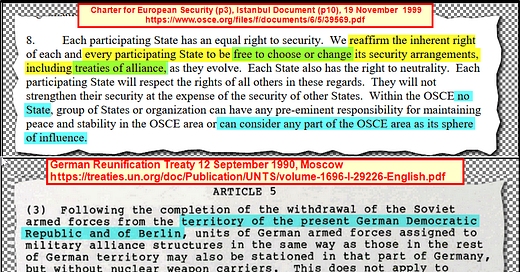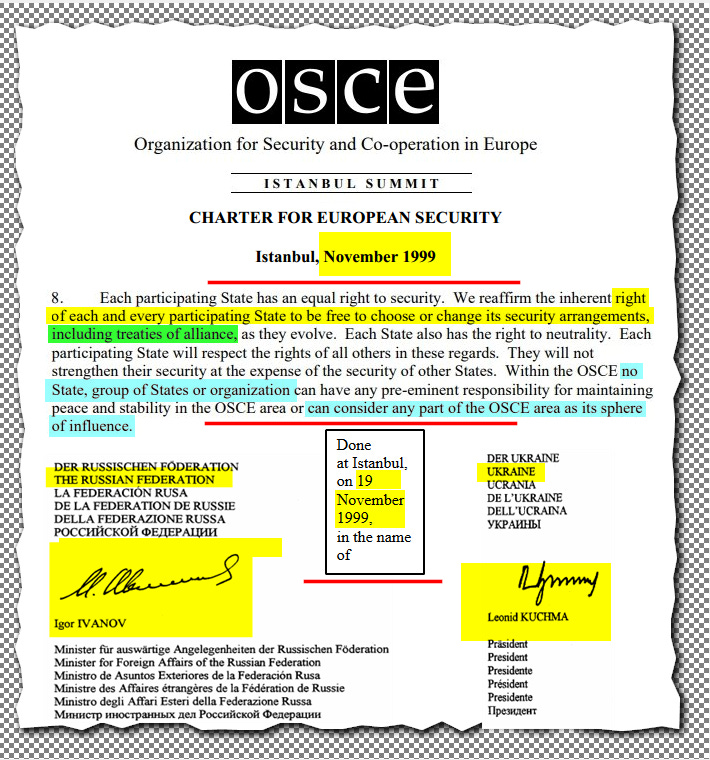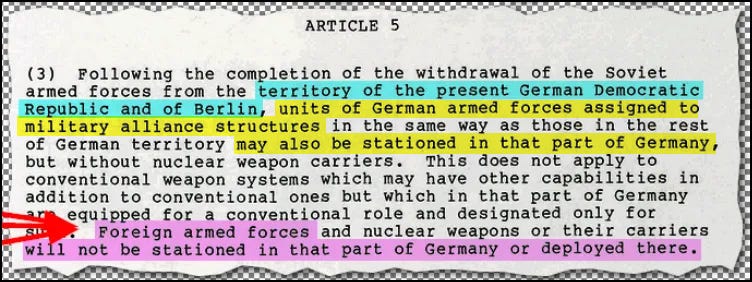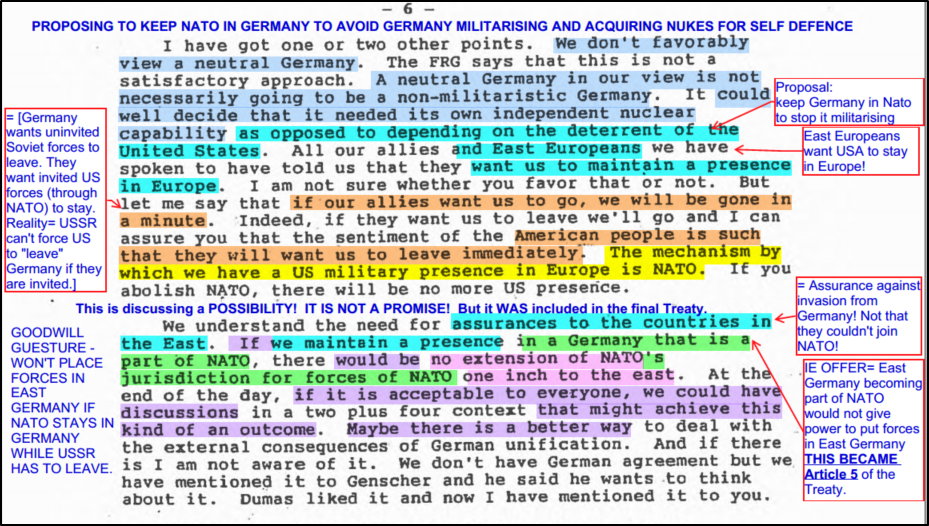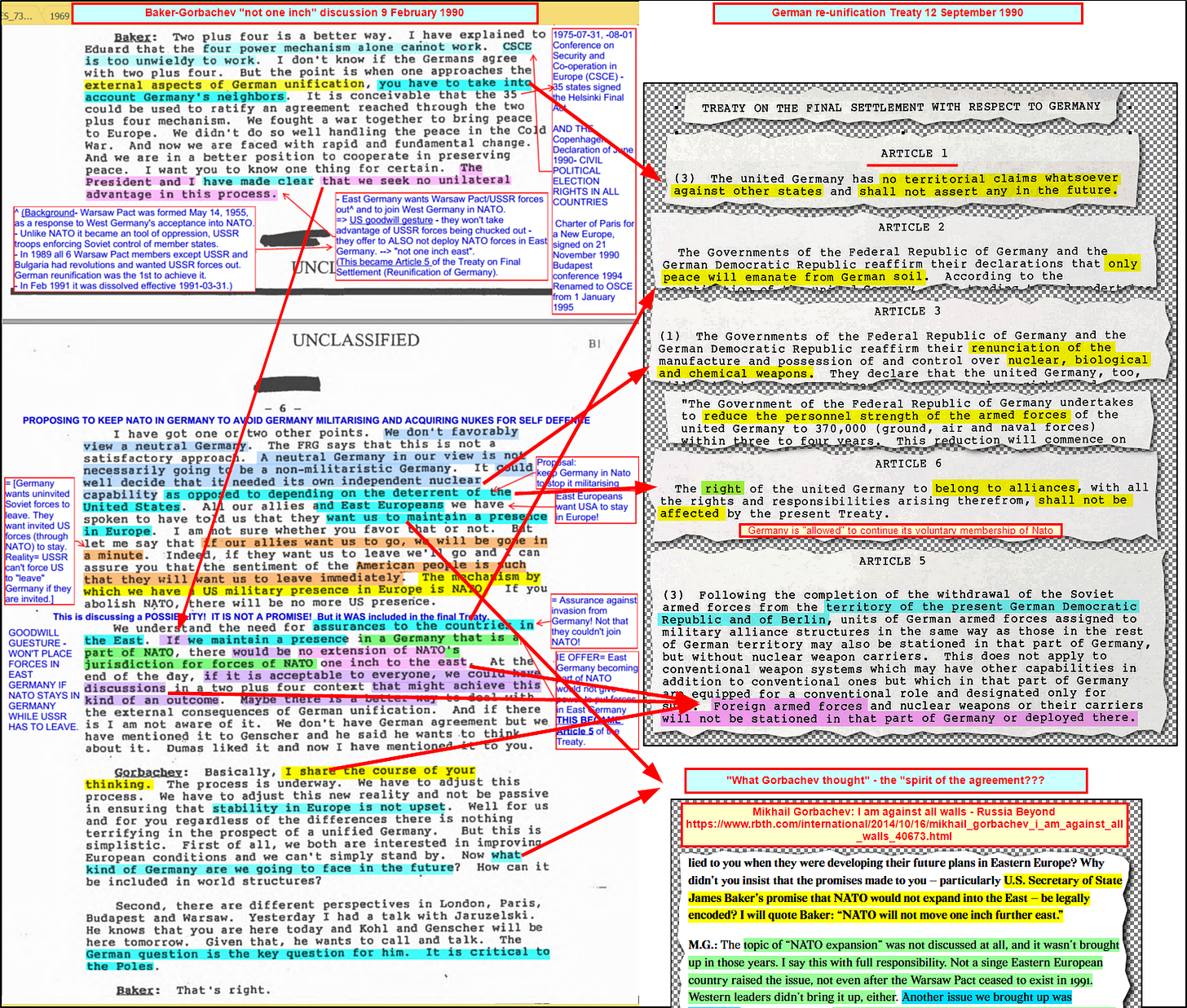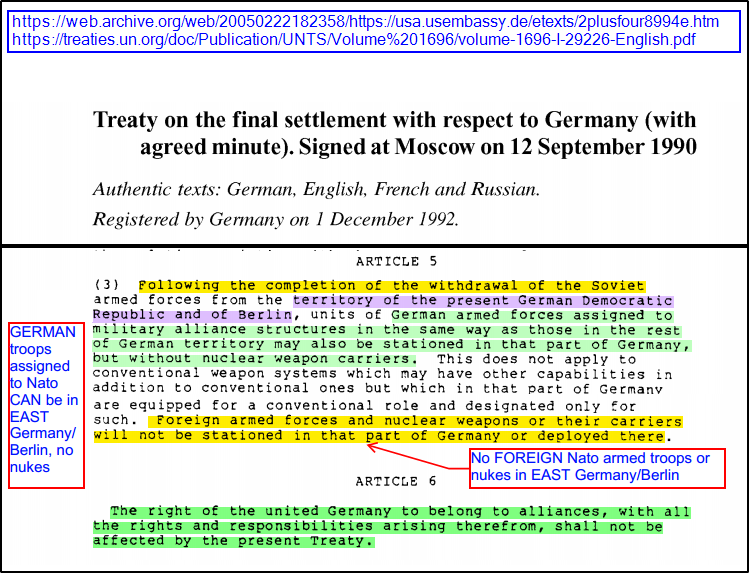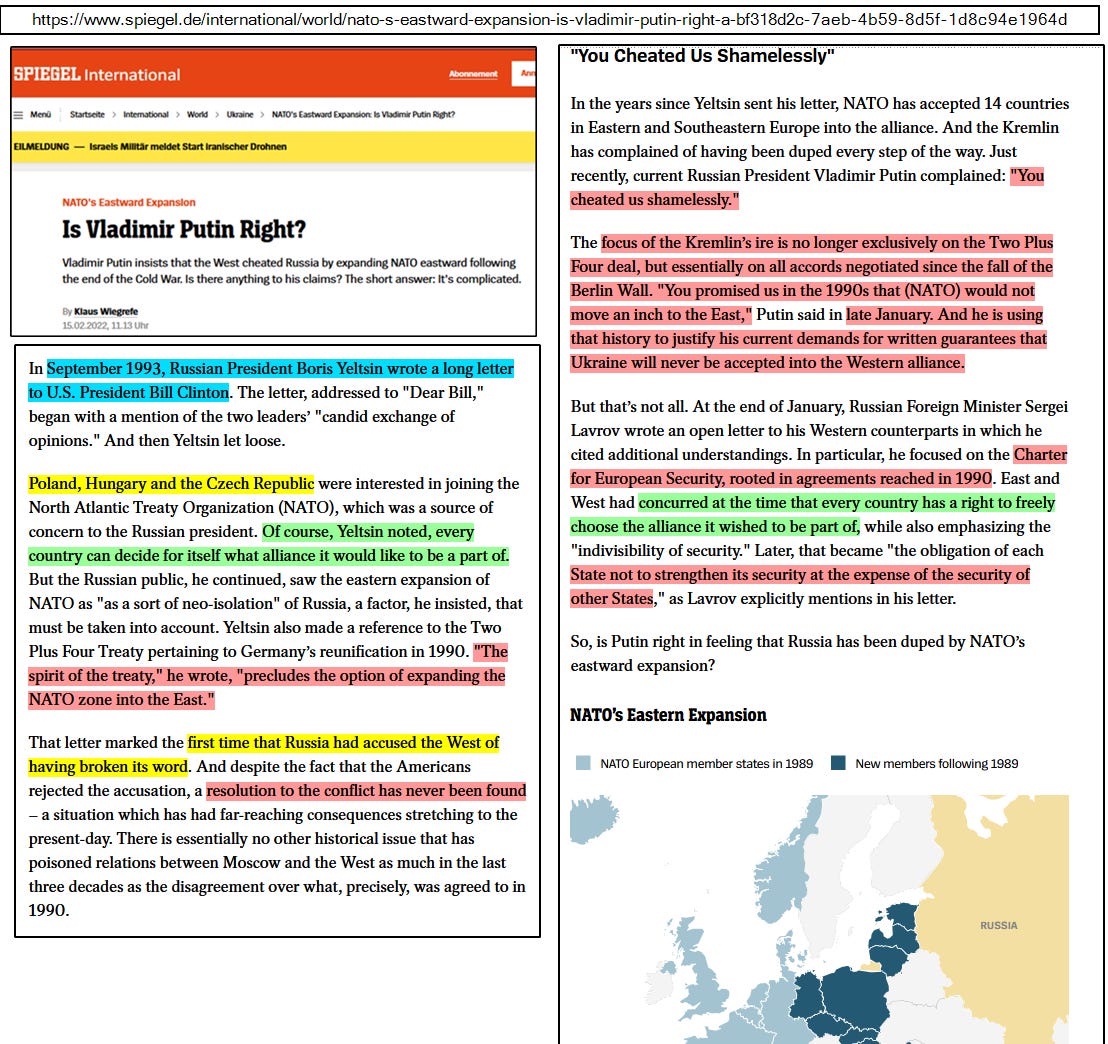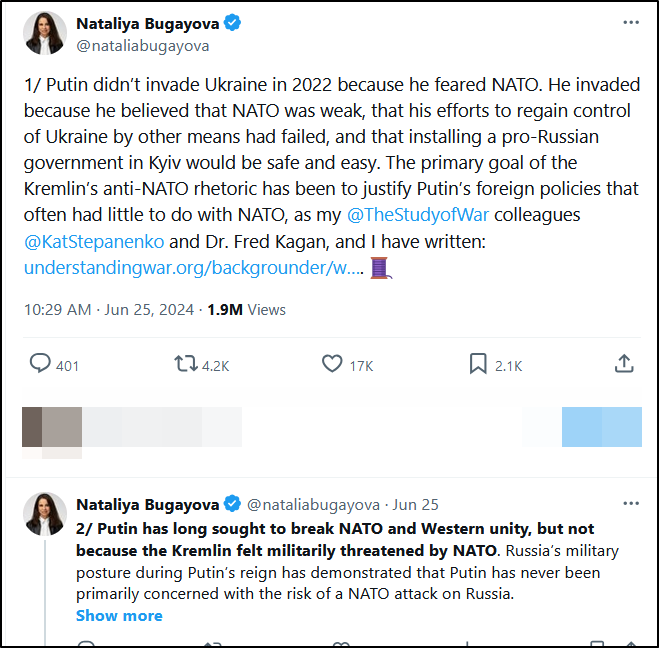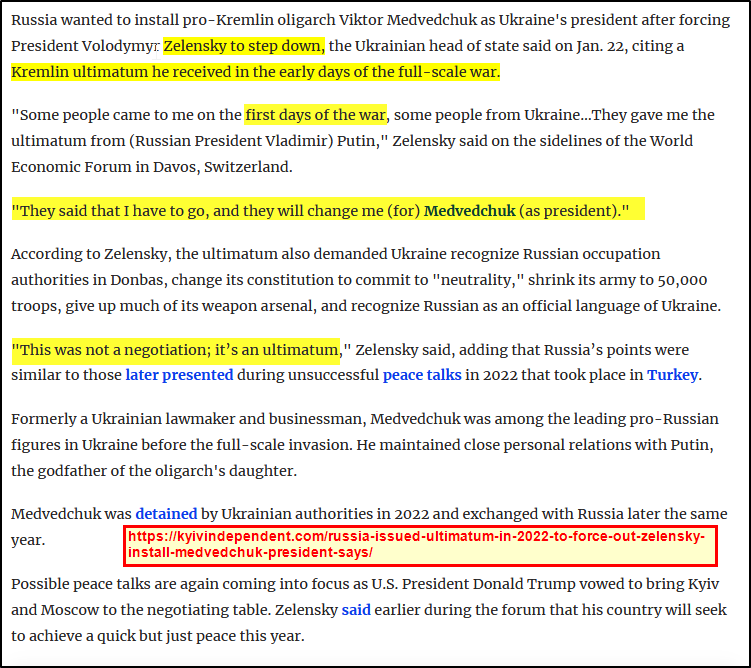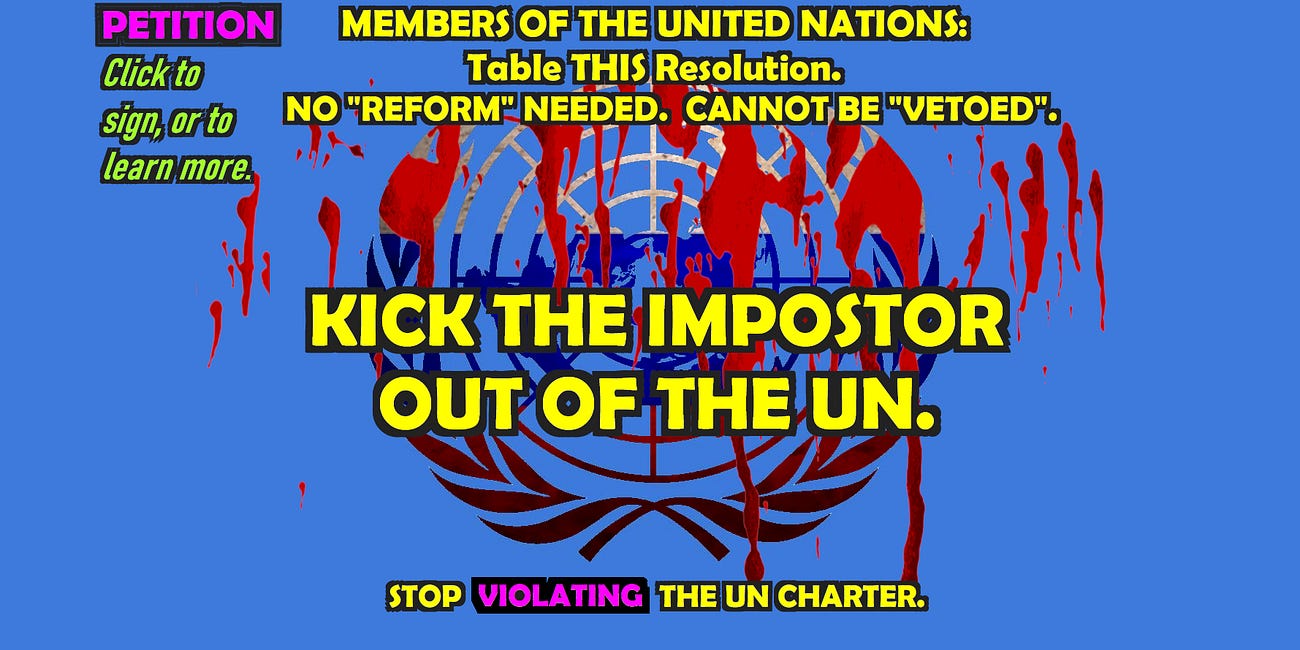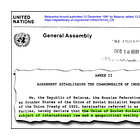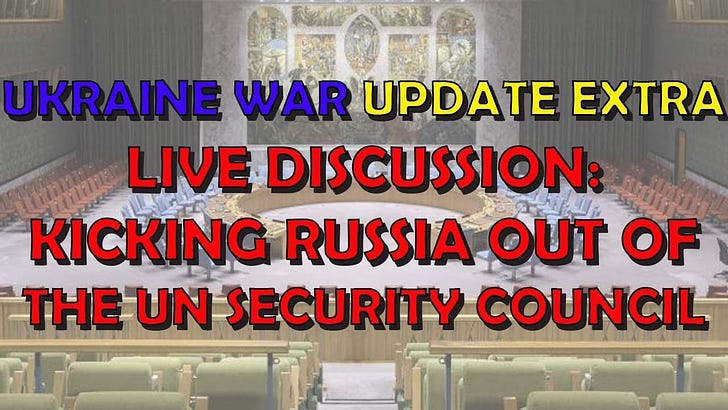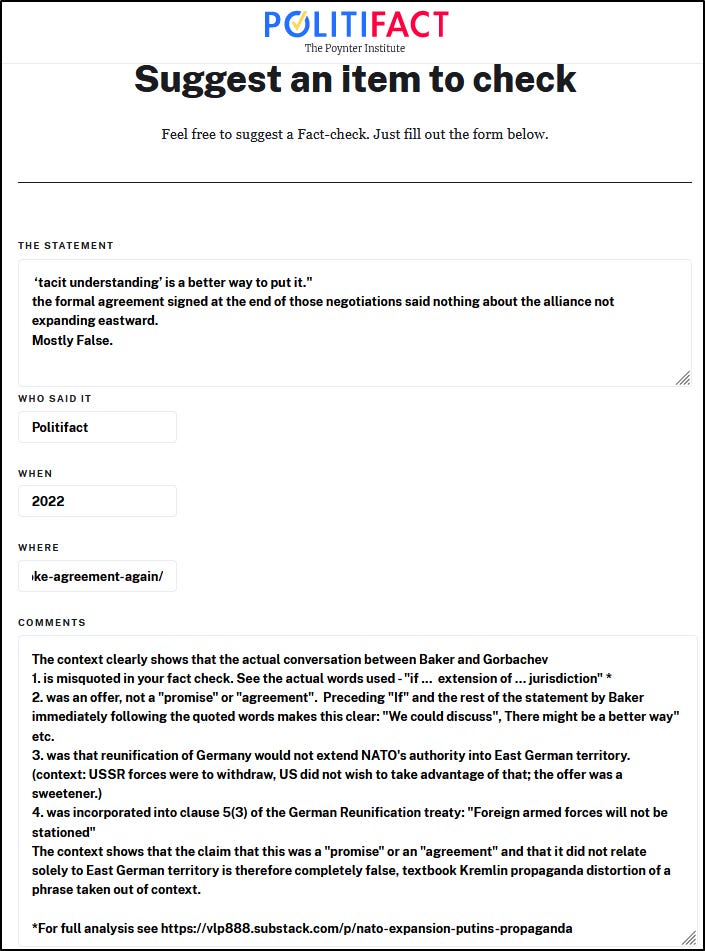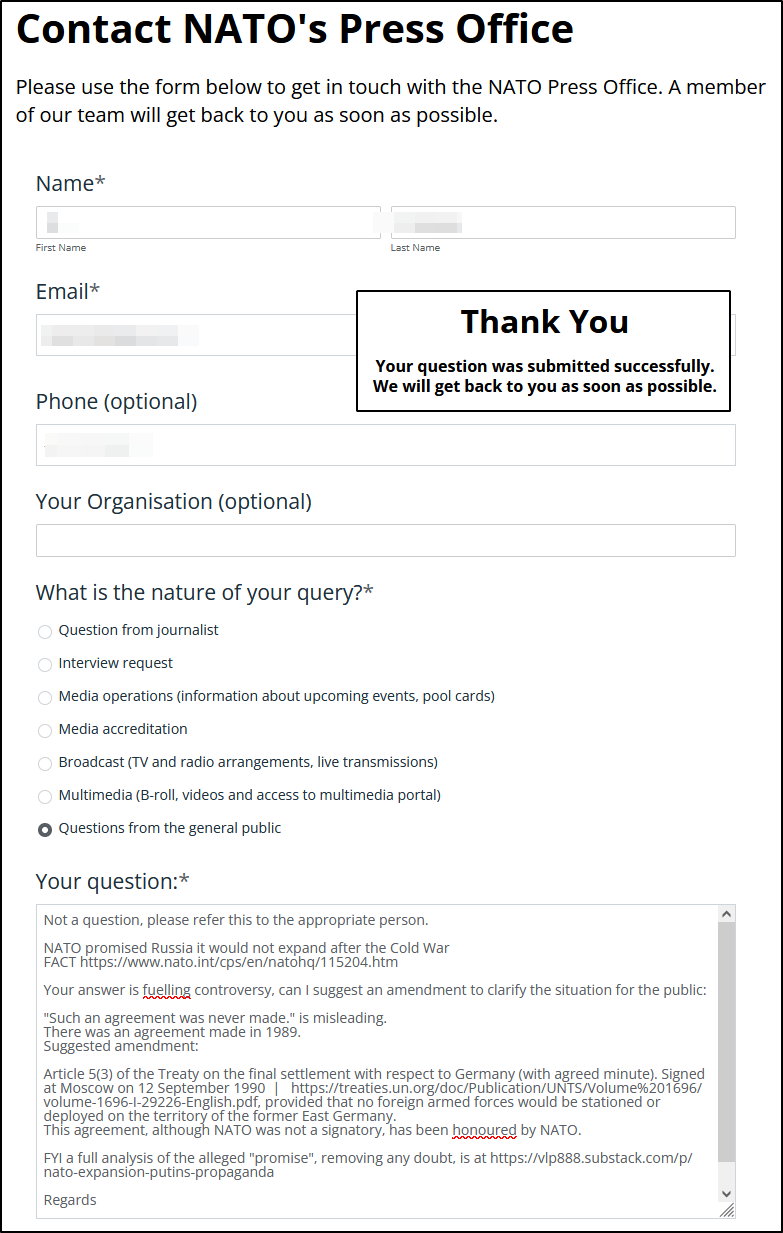"Nato expansion" - Putin's propaganda myth | Knowledge is power
Why does no one mention the Treaty Russia signed in 1999 AGREEING that Ukraine could join NATO, AND that Russia could not claim any "sphere of influence" - ????
Why does no one mention the Treaty Russia signed in 1999 AGREEING that Ukraine could join NATO, AND that Russia could not claim any "sphere of influence" - ????
Click images to view full size.
Contents
“Nato expanding“ - Russia’s agreement in 1999 when Putin was PM
5. So why is Putin banging on about a “promise not to expand?”
The 12 September 1990 German Reunification Treaty Article 6 specifically affirmed East Germany’s right to join NATO!!!
Gorbachev himself confirmed there was no assurance that other countries would not join NATO.
Mikhail Gorbachev explicitly agreed, at the time, that nations are free to join alliances.
6. Nato is not “expanding” in any case - the history of Ukraine’s wish to join
The writer’s view: Putin doesn’t care about NATO. He cares about Ukraine challenging his UN “veto”.
Next: Petition to end the violation of the United Nations Charter and restore the rule of law
“Nato expanding“ - Russia’s agreement in 1999 when Putin was PM
On 19 November 1999 the OSCE Istanbul Charter for European Security was signed by Russia, Ukraine and most other European states.

1. Russia’s agreement that Ukraine is free to join Nato
Clause 8 of the Charter for European Security provides:
''8. Each participating State has an equal right to security. We reaffirm the inherent right of each and every participating State to be free to choose or change its security arrangements, including treaties of alliance, as they evolve.”
Notably, this Charter was signed after Poland, Hungary and the Czech Republic had joined NATO on 12 March 1999. It was directly accepting the right of those countries and any other country to join NATO. (As the clause itself recites, rather than creating any new right, it explicitly reaffirmed an inherent right which belongs to all sovereign states.)

2. Russia’s agreement that it cannot claim a “sphere of influence”
The last sentence in Clause 8 explicitly states “no State … can consider any part of the OSCE area as its sphere of influence.” You can’t get much clearer than that.

3. Did Putin know about this?
There is no way he didn’t know about it. It further seems unlikely that President Boris Yeltsin would have agreed to sign any Treaty without Putin’s input:
Putin had been employed since 1990 as Foreign Affairs deputy to the Mayor of St Petersburg, involved in international negotiations. He had extensive involvement and knowledge of foreign events.
The Charter had been under negotiation since 1995. The Charter was drafted in 1997.
Putin was acting Prime Minister of Russia when the Charter for European Security was signed on 19 November 1999. He was appointed acting Prime Minister on 9 August 1999 by Russian President Boris Yeltsin and was working closely with Yeltsin as advisor. Yeltsin appointed him President less than 6 weeks later.
The next document below shows what Yeltsin would have been saying to Putin.
What Yeltsin was saying to others
“Just give Europe to Russia” - the morning of the same day Russia signed the Charter for European Security. (What an insight into the sincerity and good faith of Moscow in entering into Treaties. And into the bona fides of Clinton and his administration regarding the Budapest Memorandum. At the time perhaps it was wishfully viewed by Clinton as a joke - but history has proved it wasn’t. How could Clinton ignore this, after he had forced1 Ukraine into the Budapest Memorandum? Was Clinton even aware that his predecessor had enabled the person who said this, to illegally2 exercise a veto in the UN (violating the UN Charter), thereby enabling Yeltsin to “veto” any UN measures to stop him implementing this demand by force?
One might comment on the reliability of Russia’s signing of any Treaty, while it had been actively violating the United Nations Charter membership provisions3 since 1991, and non-aggression provisions since the invasion of Chechnya4 on 11 December 1994, 6 days after signing the Budapest Memorandum.)
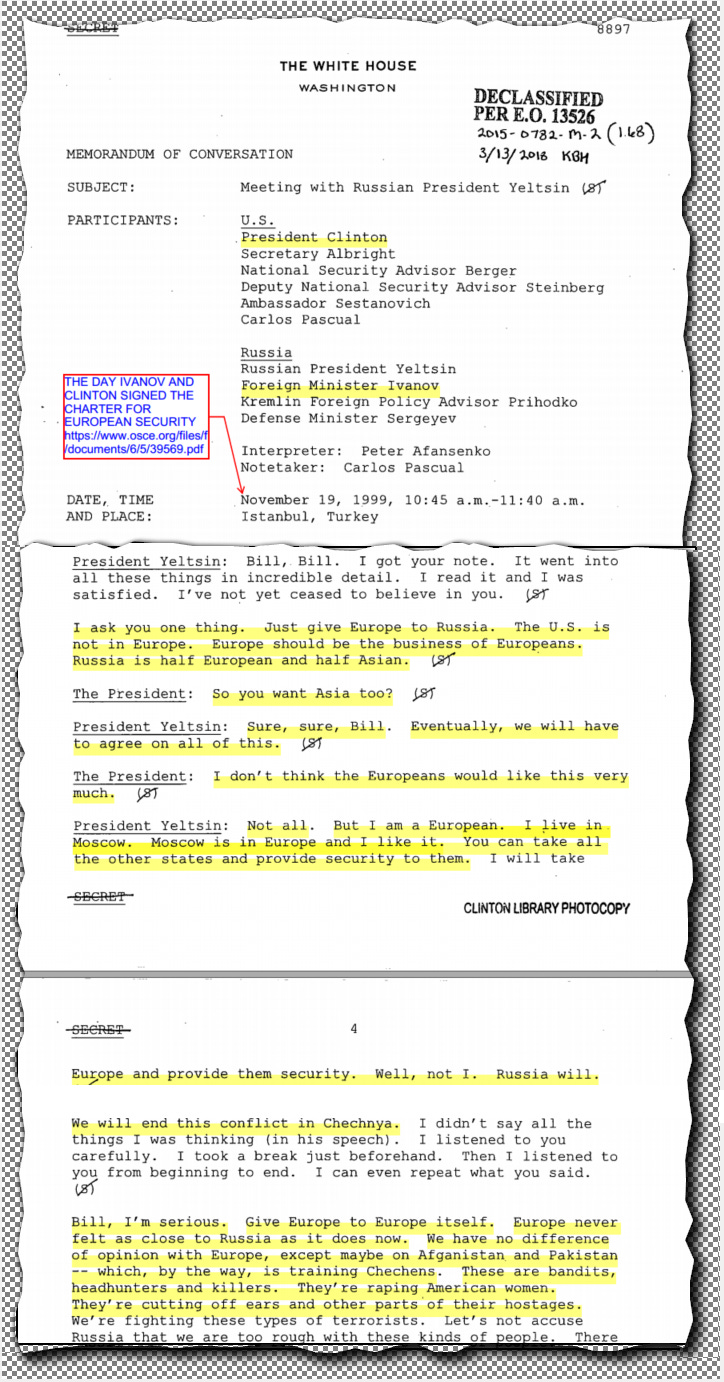
4. That very clause was invoked by Putin
In 2022, 3 days before invading Ukraine, somewhat like a 10 year old, Putin pretended there was only 1 sentence in Clause 8: “They will not strengthen their security at the expense of the security of other States”.
Creating facts to fit this sentence, Russia then claimed that Ukraine’s wish to join NATO was threatening Russia. (Much like Putin is claiming that Ukraine is threatening Russia while Putin is invading Ukraine.)
4 problems:
There was no strengthening of security remotely approaching an “expense to the security” of Russia,
There was no imminent prospect of Ukraine joining NATO.
There was no indication that NATO would put anything on Ukrainian soil. For example, it has no forces, arms or equipment in East Germany.
Even if any of these had happened (which they didn’t), it would not give Putin any right to violate the entire Charter, invade and destroy a country. The Charter specifically forbids aggression, along with numerous other Treaties, all broken by the invasion.
5. So why is Putin banging on about a “promise not to expand”?
Repetition of competing opinions, rather than proper analysis, on fact check sites, has generated more heat than light.5
Putin is twisting a conversation that said nothing of the kind. The conversation occurred in February 1990, 9 years before the issue was closed by the Charter for European Security. It is completely irrelevant. Even if it meant what he claims (which it clearly didn’t), it was superseded by the Charter for European Security. Someone happened to use a colourful phrase for emphasis. Yeltsin and Putin, who had nothing to do with the discussion, seized upon the phrase years later, like a dog with a bone.
James Baker-Gorbachev conversation February 1990 - “Not one inch east”, and the Treaty on Final Settlement (Reunification of Germany) signed 12 September 1990.
There is a collection of bits of correspondence regarding this phrase at NATO Expansion: What Gorbachev Heard | National Security Archive.
The page is not a “National Security Archive”. It is a blog on a university web site.
The page proceeds to claim that the documents are saying something completely different from what their actual words say.
Assuming that the documents themselves are authentic (which the writer has not checked), lets look at what the documents themselves say.
The correspondence is discussing an offer, conveyed by US Secretary of State James Baker to President Gorbachev in February 1990, that if the USSR/Warsaw Pact forces were withdrawn from East Germany, NATO wouldn’t deploy its forces (which were already in West Germany) there either.
Context: Germany was unifying, whether anyone liked it or not. The whole of Europe was afraid that Germany might repeat what it had done after World Wat 1 - and invade them again. East Germany wanted Warsaw Pact/USSR forces out and to join West Germany in NATO. So the US, as a goodwill gesture, said it would not take advantage of USSR forces being chucked out - and offered that, even if East Germany wished to became part of NATO through the reunification, NATO also would not deploy its forces in East Germany. James Baker used the term: [the joining by East Germany with NATO member West Germany would not cause] “extension of NATO’s jurisdiction for forces of NATO one inch to the east".
(In other words, East Germany joining NATO would not give NATO authority to station forces in East Germany.)

This became Article 5(3) of the Treaty on Final Settlement (Reunification of Germany.
(Note: German NATO forces are allowed “one inch east”. The final agreement was that only foreign forces would not be in the territory of East Germany and Berlin.)
Unlike the USSR’s and Russia’s Treaty obligations, Article 5(3) has been honoured by the US and NATO, to this day.

(Background: The Warsaw Pact was formed May 14, 1955, as a response to West Germany's acceptance into NATO. Unlike NATO, the Pact became an tool of oppression, USSR troops enforcing Moscow control of member states. In 1989, when the USSR was faltering, all 6 Warsaw Pact members except USSR and Bulgaria had revolutions and wanted USSR forces out. German reunification was the first to achieve it. 5 months later, on 27 February 1991, the Warsaw Pact was dissolved by all the members, effective 31 May 1991. However, at the time of Baker’s statement in February 1990, no one envisaged this would happen.)
Was there even a “promise”? - the obvious starting point.
“If we maintain a presence in a Germany that is a part of NATO, there would be no extension of NATO’s jurisdiction for forces of NATO one inch to the east. … If it is acceptable to everyone, we could have discussions … that might achieve this kind of an outcome. Maybe there is a better way…”
It wasn’t a “promise”. It was an offer, to make a substantial concession, both on the part of Germany, and NATO, if it was agreed. To limit Germany’s sovereignty and self-defence capability, by undertaking not to allow NATO forces to be deployed on the territory of the former east Germany. The offer was later accepted by Germany, and written into Article 5(3) of the Treaty 7 months later.
There was no need to make the concession. Nor did the US have any power to implement it - it had no authority to bind either Germany or NATO. It was Germany’s sovereign right to have NATO forces anywhere on it’s territory. US offered to facilitate it as a gratuitous gesture of goodwill, to keep the USSR happy while they both stopped Germany from re-arming. As Baker explained, the US was not seeking any advantage from the unification.
The discussion is set out below, side by side with the Reunification Treaty provisions to show the context of the discussions.
Article 4 of the Treaty required Soviet forces to leave East Germany and Berlin. That was Germany’s sovereign decision, because Germany did not want them there. And that was the reason for the offer that US would voluntarily not be there either.
What Yeltsin and Putin twisted into a broken promise was in fact a great piece of negotiating and goodwill to achieve an agreement that was needed, to stop Germany re-militarising and potentially repeating what it had done after the first World War.
The 12 September 1990 German Reunification Treaty Article 6 specifically affirmed East Germany’s right to join NATO!!!
Note - the affirmation is of an existing right. Russia acknowledged that states had this right already.
Gorbachev himself confirmed there was no assurance that other countries would not join NATO.
Mikhail Gorbachev: I am against all walls - Russia Beyond
“the topic of “NATO expansion” was not discussed at all, and it wasn’t brought up in those years. I say this with full responsibility. Not a singe Eastern European country raised the issue, not even after the Warsaw Pact ceased to exist in 1991. Western leaders didn’t bring it up, either”
“The agreement on a final settlement with Germany said that no new military structures would be created in the eastern part of the country; no additional troops would be deployed; no weapons of mass destruction would be placed there. It has been observed all these years.” (emphasis added)
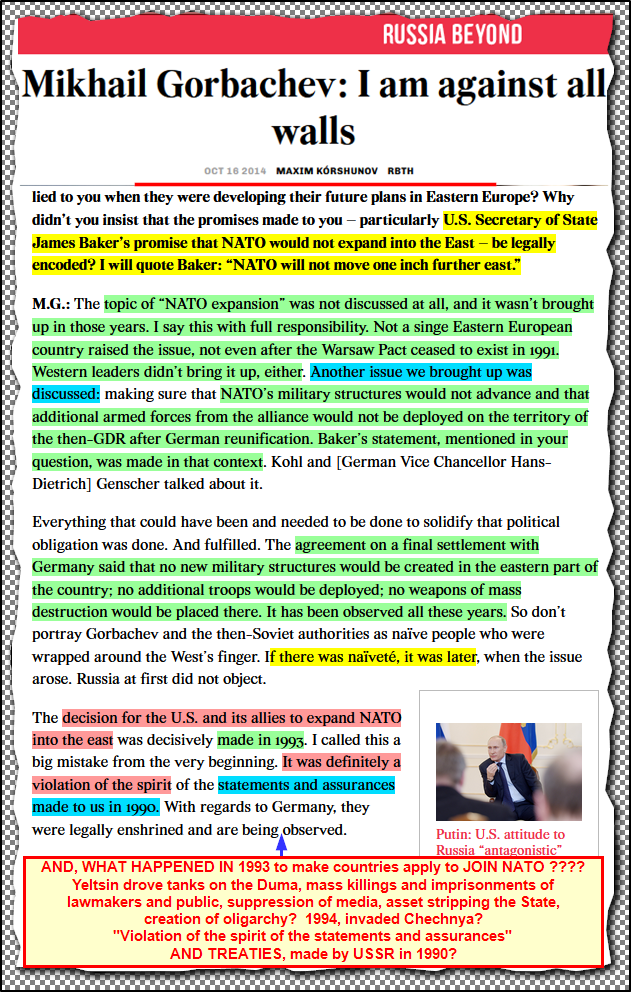
What were these “statements and assurances” referred to at the end of the article? There were none - Gorbachev himself says everything in relation to the reunification Treaty was fulfilled.
But there were other more important assurances and statements - and treaties, made elsewhere, at the time. The Copenhagen Declaration of June 1990, and the Charter of Paris for a New Europe, signed on 21 November 1990, which introduced an obligation on governments to provide human rights, including election rights, to their citizens.
But Gorbachev and the USSR didn’t stay around to carry them out. While all other ex soviet states signatories welcomed them and complied, the new Russia under Boris Yeltsin alone didn’t, along with Serbia. (But Serbia hadn’t made any promises and was in a state of war.)
Mikhail Gorbachev explicitly agreed, at the time, that nations are free to join alliances.
‘There was no promise not to enlarge NATO’ - Harvard Law School | Harvard Law School: Eyewitness: “Bush asked Gorbachev if he agreed with the Conference on Security and Cooperation in Europe principle that nations are free to ally with others as they see fit. When Gorbachev said yes …“Gorbachev agreed again,” Zoellick recalls, to the principle that Germany could choose to enter NATO.
No term regarding other countries joining NATO was included in the treaty of Unification of Germany 1989, signed 7 months after the most quoted statement by Secretary of State James Baker, made in the course of the negotiations for that Treaty.
Yeltsin twisting the facts - 1993 letter.
Oh the irony - Yeltsin and Putin, while they are tricking the world about UN membership, claiming that they have been tricked - when they weren’t …
1993-09 YELTSIN LETTER - POLAND HUNGARY, CZECH REP WANTED TO JOIN NATO 'NATO's Eastward Expansion: Is Vladimir Putin Right? - DER SPIEGEL
Charter for European Security, rooted in agreements reached in 1990
State not to strengthen its security at the expense of the security of other States
concurred at the time that every country has a right to freely choose the alliance it wished to be part of,
Of course, Yeltsin noted, every country can decide for itself what alliance it would like to be a part of.
"The spirit of the treaty," he wrote, "precludes the option of expanding the NATO zone into the East."
September 1993, Russian President Boris Yeltsin wrote a long letter to U.S. President Bill Clinton
first time that Russia had accused the West of having broken its word
resolution to the conflict has never been found
originally appeared in German in issue 7/2022 (February 11th, 2022) of DER SPIEGEL
"You cheated us shamelessly."
focus of the Kremlin’s ire is no longer exclusively on the Two Plus Four deal, but essentially on all accords negotiated since the fall of the Berlin Wall6. "You promised us in the 1990s that (NATO) would not move an inch to the East,"
late January. And he is using that history to justify his current demands for written guarantees that Ukraine will never be accepted into the Western alliance.
Poland, Hungary and the Czech Republic were finally admitted to NATO in March 1999. Article 8 of the Charter for European Security (above) was an explicit acknowledgement by Russia of consent to their joining.
All this is completely academic, of course, because whatever it meant, and whatever it’s status at the time was, it has been over-ridden by the express agreement in clause 8 of the Charter for European security.
This is just another illustration of Putin’s propaganda re-writing of history: taking a true fact out of context and misconstruing it.
6. Nato is not “expanding” in any case - the history of Ukraine’s wish to join
This has been fully answered along with the context that proves NATO was never a concern of Putin’s, by Nataliya Bugayova of the Institute for Study of War. (Click the image below to open and read the thread):
(If you prefer, it’s read out here with commentary - cued)
The writer’s view: Putin doesn’t care about NATO. He cares about Ukraine challenging his UN “veto”.
The real reason for Putin’s invasions of Ukraine has become painfully clear, since he declined offers of everything he demanded in 2022, including offers of neutrality and not to join NATO. Except removal of Ukraine’s elected President, and vitually complete demilitarisation.
What did the Zelensky administration do to make Putin so insistent on his removal?
This??? Putin would surely have been aware of investigations and discussions leading up to this public declaration by Ukraine’s permanent representative to the United Nations, 2 weeks before his invasion.
We can be very sure that Putin has been acutely aware of the risk of this exposure of the 1991 fraud, throughout.
His desperation to suddenly control this the Ukrainian government, is consistent with stopping an independent Ukraine government exposing Russia’s fraud on the UN - and removing Putin’s UN “veto” and UN disinformation megaphone - his entire world hegemony.
That is the existential threat he refers to but never by name.
Membership of NATO would stop him controlling the government of Ukraine.
He raised it each time Ukraine removed his puppet Presidents. After the 2004 Orange Revolution, and after the 2014 Maidan.
Without the ability to stop the UN and confuse and polarise the world community, Russia is a gas station with a bankrupt economy smaller than France, and an army struggling to advance against Ukraine.
Conclusion
So yes, if you leave out the elephant in the room of the Charter for European Security, Articles 5(3) and 6 of the Reunification Treaty, Gorbachev’s denial, the sovereignty and agency of the countries that applied to join NATO, and the reasons they did, and you left out that NATO was actually reluctant and was not accepting members willy-nilly, you could twist the situation into “NATO expanding in violation of the spirit of the Treaty of German Re-unification” as it was morphed into by Yeltsin, and US being aggressive, as it was morphed into by Putin.
But you’d have to be Russian to do so.
Putin has no complaint in relation to NATO and no basis for a claim of “enlargement”. Nato is a pact between nations to protect each other against invasion. Countries have chosen to join it because of Russia’s aggression towards nations, in accordance with their inherent sovereign rights to join alliances as they wish.
His complaint about NATO is a smoke screen for his real motive, which is to subjugate the Ukrainian people to stop them electing governments which challenge his illusory UN “veto”.
The issue comes down to the UN’s violation of it’s own Charter, allowing a non-member to control it.
This can easily and must be remedied, by a simple majority resolution of the United Nations.
Next: Petition to end the violation of the United Nations Charter and restore the rule of law
See also:
2024 DW Documentary on the history of NATO:
40:49 John Bolton on ex Warsaw Pact countries following 1991 breakup of USSR
Putin’s 2022-02-19 speech 3 days before invading Ukraine: (watch his body language)
41:36 mentioning a right to join alliances but twisting the 1999 Charter Clause 8 “[Each state] shouldn’t strengthen their security at the expense of other states” into “that choice shouldn’t pose a threat to other nations”
42:30 “promise” claim - omitting the timeline and specific agreement in the 1999 Charter 9 years later
When the West Defanged Ukraine, George Bogden 2022
ibid

